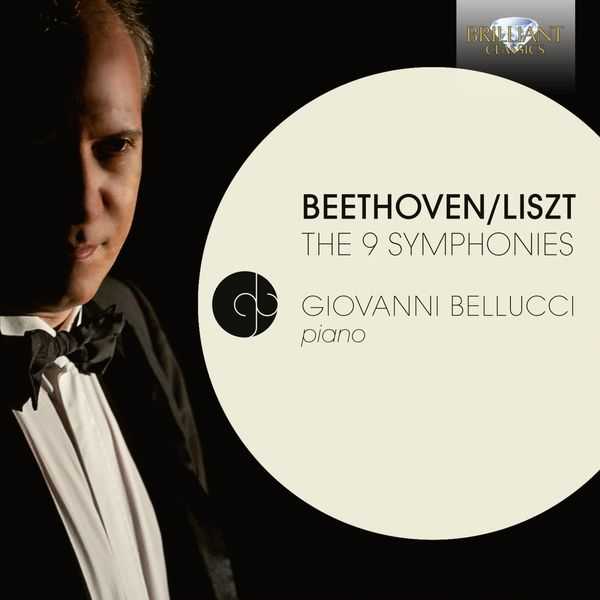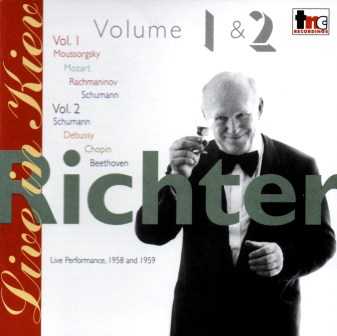
Composer: Ludwig van Beethoven, Ferencz Liszt
Performer: Giovanni Bellucci, Czech Philharmonic Choir of Brno
Number of Discs: 5
Format: FLAC (tracks)
Label: Brilliant Classics
Catalogue: 94863
Release: 2022
Size: 1.32 GB
Recovery: +3%
Scan: yes
Symphony No. 1 in C Major, Op. 21
01. I. Adagio molto – Allegro con Brio
02. II. Andante cantabile con Moto
03. III. Menuetto. Allegro molto e Vivace
04. IV. Adagio – Allegro molto e Vivace
Symphony No. 3 in E-Flat Major, Op. 55 “Eroica”
05. I. Allegro con Brio
06. II. Marcia funebre. Adagio Assai
07. III. Scherzo. Allegro vivace – Trio
08. IV. Finale. Allegro molto – Poco andante – Presto
Symphony No. 2 in D Major, Op. 36
09. I. Adagio molto -Allegro con Brio
10. II. Larghetto
11. III. Scherzo. Allegro – Trio
12. IV. Allegro Molto
Symphony No. 5 in C Minor, Op. 67
13. I. Allegro con Brio
14. II. Andante con Moto
15. III. Scherzo. Allegro
16. IV. Allegro
Symphony No. 4 in B-Flat Major, Op. 60
17. I. Adagio – Allegro Vivace
18. II. Adagio
19. III. Allegro vivace -Un poco meno Allegro
20. IV. Allegro ma non Troppo
Symphony No. 7 in A Major, Op. 92
21. I. Poco sostenuto – Vivace
22. II. Allegretto
23. III. Presto – Assai meno Presto
24. IV. Allegro con Brio
Symphony No. 6 in F Major, Op. 68 “Pastorale”
25. I. Erwachen heiterer Empfindungen bei der Ankunft auf dem Lande. Allegro ma non Troppo
26. II. Szene am Bach. Andante molto Moto
27. III. Lustiges Zusammensein der Landleute. Allegro
28. IV. Donner. Sturm. Allegro
29. V. Hirtengesang. Frohe und dankbare Gefühle nach dem Sturm. Allegretto
Symphony No. 8 in F Major, Op. 93
30. I. Allegro vivace e con Brio
31. II. Allegretto Scherzando
32. III. Tempo di Menuetto
33. IV. Allegro Vivace
Symphony No. 9 in D Minor, Op. 125 “Ode to Joy”
34. I. Allegro ma non troppo un poco Maestoso
35. II. Molto vivace – Presto
36. III. Adagio molto e cantabile – Andante Moderato
37. IV. Presto – Allegro Assai
Issued complete for the first time, a new recording of Franz Liszt’s iconic piano transcriptions of the nine Beethoven symphonies. As the Italian pianist Giovanni Bellucci remarks in an extensive booklet introduction, this album is the fruit of study over the past 20 years and more, into the worlds of both Beethoven and Liszt and their meeting point in these transcriptions where the Hungarian composer sought to honour his forebear as the original leader of an artistic movement we now think of as Romanticism, where the composer places himself at the front and centre of his works.
Liszt’s transcriptions diverged from the ready-made arrangements which publishers rapidly produced and reprinted to meet the demands of amateur and domestic audiences. Here, the symphonic world of Beethoven is not merely experienced as a distant echo but translated into the idiom of the virtuoso piano which swept across Europe during the latter half of the 19th century, led by Liszt and Clara Schumann.
Thus in these performances, Bellucci seeks a kind of fidelity to the Romantic age of the transcriptions rather than the Classical age of the original works. Taking broad tempi and probing deeply into textures which, after all, condense the soundworld of an entire orchestra into the span of ten fingers, Bellucci presents an individual and compelling new vision of works which renew themselves at the hands of each new generation’s interpreters.
The cycle reaches its climax with the Ninth, recorded live at the 2014 Lisztomania Festival in France, with the participation of the Czech Philharmonic Choir of Brno and soloists Hana Škarková, Lucie Hilscherová, Michal Lehotský and Martin Gurbal. Other studio sessions have taken place in the famous Salle de Musique at La Chaux de Fonds in Switzerland, between 2018 and 2021. “In completing the project”, Bellucci remarks, “I would like to borrow Franz Liszt’s words and make them mine, albeit just for a moment: “The piano is, for me, what the frigate is for the sailor, indeed, perhaps even more, because the piano is my word, is my life”.
In transcribing the 9 Beethoven Symphonies for piano solo Franz Liszt (1811-1886) not only made these symphonic masterworks available for domestic use but also demonstrated his immense creativity, insight, knowledge and pianistic resources. The work of a true genius, these transcriptions reveal the essential language and message of Beethoven, written down in pianism of the highest quality and difficulty, in this sense still valuable today. It takes a pianist of near superhuman powers and virtuosity to do justice to these scores. Giovanni Bellucci is such a pianist. Not only he “plays all the notes” but he is able to recreate the grandeur, drama, lyricism and intimacy of the original, presenting a monument made up of countless details.



